|
|
|
Sort Order |
|
|
|
Items / Page
|
|
|
|
|
|
|
| Srl | Item |
| 1 |
ID:
107666
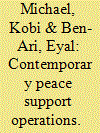

|
|
|
|
|
| Publication |
2011.
|
| Summary/Abstract |
In this article the authors examine two set of issues that constrain contemporary peace support operations (PSOs): one centered on the kinds of knowledge prevalent in PSOs and the second involving the organizational structures that characterize them. The authors' aim is to show the deep discursive and structural limitations and contradictions that continue to characterize the actions of armed forces and the dominance of militaristic thinking within PSOs. This article centers on multidimensional peacekeeping marked by emphasizing two main points in regard to the complex nature of such peacekeeping. First, Western military thinking is still dominant in the professional discourse of peacekeeping despite the fact that in many cases it is less relevant to the arenas where it is applied (in weakened or failed states). Second, forces in second-generation peacekeeping missions are by definition a form of hybrid organizations, and therefore conceptual changes in regard to PSOs not only involve the realm of knowledge but also entail practical consequences for the very organizational means used to achieve their aims. The authors' analysis demonstrates the blending, hybridization, and linkages that are an essential part of PSOs as processes that carry both advantages and disadvantages for organizational action.
|
|
|
|
|
|
|
|
|
|
|
|
|
|
|
|
| 2 |
ID:
107668
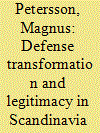

|
|
|
|
|
| Publication |
2011.
|
| Summary/Abstract |
This article analyzes how defense transformation in Scandinavia has been legitimized and which legitimacy it enjoys. The overall result is that it does not have unambiguous support. There are, however, similarities and differences, both between the North Atlantic Treaty Organization (NATO) members Denmark and Norway and nonaligned Sweden, and between the NATO members. Theoretically, the alliance members should be more willing to transform-even if it implies a "denationalization" of defense. In Denmark, that is, with some reservation, the case but not in Norway. Nonaligned Sweden should, according to the same logic, be resistant to downsizing the armed forces and gearing them for NATO expeditionary war fighting operations. However, that is not the case. A consequence of the negative attitude toward the transformation is less influence, resources, freedom of action, and so on, for the defense forces in general, and an even more lukewarm attitude toward conducting combat operations in a NATO context in particular.
|
|
|
|
|
|
|
|
|
|
|
|
|
|
|
|
| 3 |
ID:
107663


|
|
|
|
|
| Publication |
2011.
|
| Summary/Abstract |
With establishment of the U.S. Selective Service System in 1917, selective draft rules placed consideration of registrants' economic obligations to their dependents front and center. By observing the Canadian and British recruitment experiences, American policy makers opted against universal conscription since they believed it would be costly because of the need to offer family allowances and opted against a voluntary system since they believed that too many bachelors would fail to volunteer. Dependency deferments were designed to minimize the social and economic costs of war. Local board members determined whether a man was a genuine breadwinner or not, and individual discretion on this matter contributed to the higher rates of African American draftees during WWI compared to white draftees, since African American men were less likely to be recognized as genuine breadwinners. Selective Service rules thus resulted in reproducing female citizens as economic dependents and yielded durable inequalities among registrants.
|
|
|
|
|
|
|
|
|
|
|
|
|
|
|
|
| 4 |
ID:
107670
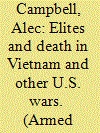

|
|
|
|
|
| Publication |
2011.
|
| Summary/Abstract |
Research on class bias in military service has focused on service and death among the economically disadvantaged during the Vietnam War. This study uses the war records of elite colleges to examine elite participation in five major wars. Significant differences in elite participation across wars are found, with lower rates during the Civil, Korean, and Vietnam Wars and higher rates during the World Wars. The similarities between Korea and Vietnam indicate that political unrest related to the Vietnam War was not the sole cause of low levels of elite participation. Changes in the size and structure of the post-World War II military are hypothesized as alternative causal factors.
|
|
|
|
|
|
|
|
|
|
|
|
|
|
|
|
| 5 |
ID:
107669
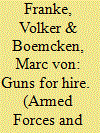

|
|
|
|
|
| Publication |
2011.
|
| Summary/Abstract |
Whereas the values, attitudes, and motivations of soldiers serving in their countries' armed forces have been widely studied, to date we know very little about the motivations and occupational self-perceptions of individuals working for the private security industry. Using data obtained through an online survey, this article explores the values and attitudes of more than 200 private contractors with law enforcement backgrounds and operational experience providing armed security services in conflict regions. Contrary to media-dominating images of ruthless, money-grabbing mercenaries, respondents in our sample displayed attitudes comparable to those of military professionals, adhering to high levels of professionalism and ethical conduct and motivated largely by altruistic factors.
|
|
|
|
|
|
|
|
|
|
|
|
|
|
|
|
| 6 |
ID:
107665
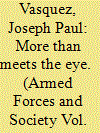

|
|
|
|
|
| Publication |
2011.
|
| Summary/Abstract |
At first glance, Britain's decision in 1957 to end conscription appears to be explainable solely by external factors since that change coincided with the decision of Harold Macmillan's government to bolster its nuclear capability following the embarrassing Suez Crisis. Furthermore, the decision was framed as a cost-cutting move amid budgetary challenges. However, that decision was substantially influenced by the fact that deployment of conscripts was heavily constrained by British domestic politics. Similarly, the merits of conscription for generating a large pool of reservists had limited utility given the political sensitivity of mobilizing reservists. The nature of the domestic constraints-both political and social-on conscription are also evident in the fact that London opted to forego selective service and scrap mandatory military service altogether. This action accelerated British imperial decline after independence was granted to India, which had previously been a sizeable colonial reservoir of British military manpower.
|
|
|
|
|
|
|
|
|
|
|
|
|
|
|
|
| 7 |
ID:
107662
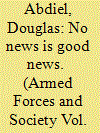

|
|
|
|
|
| Publication |
2011.
|
| Summary/Abstract |
The Australian government and military have maintained humanitarian interventions for far longer than any comparable U.S. humanitarian intervention. This longevity confounds most traditional international relations theories. It seems that the key variable is public support for humanitarian interventions. The U.S. public quickly grew impatient with humanitarian operations, while the Australian public has not yet done so. Two reasons for the Australian public's forbearance are explored. First, the idea that the Australian military and government are proficient at these operations and that the public supports these operations because it "loves a winner" is found wanting. Second, innate differences between the United States and Australia, particularly regarding news media, are explored; these differences seem to be highly correlated with the longevity of the operations. It seems likely that the Australian public does not hear enough about these operations to be concerned about them or question their utility, efficacy, or cost.
|
|
|
|
|
|
|
|
|
|
|
|
|
|
|
|
| 8 |
ID:
107667


|
|
|
|
|
| Publication |
2011.
|
| Summary/Abstract |
The developments global politics has experienced over the past twenty years have altered the conditions for being a soldier in Germany like in many other countries as well. The way in which national defense had been understood lost plausibility with the end of the Cold War. Conflict and threat scenarios changed and the missions of the armed forces were largely reconceptualized to include multinational crisis management. The effects of this redefinition of tasks and of the unconventional military engagements are as yet underexplored. In particular, there are gaps in our knowledge of how institutional regulations and the formulation of the norms which inform social practices in society and the armed forces relate to one another under the changed political circumstances of contemporary military missions. The article addresses the related changes with particular consideration of the ways in which soldiers in Germany make new sense of their contemporary tasks and roles.
|
|
|
|
|
|
|
|
|
|
|
|
|
|
|
|
| 9 |
ID:
107664
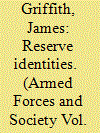

|
|
|
|
|
| Publication |
2011.
|
| Summary/Abstract |
Identities of reservists, primarily those of the U.S. military, are examined in the context of identity theory. In the current study, previously acknowledged identities of reservists are reliably measured and are shown to have construct validity. Scales were constructed from items on a previous survey of National Guard members (N = 1,256). Survey data were then used to establish scale reliability, both exploratory factor analysis and internal reliability. Scales had construct validity: Scale scores supported hypotheses derived from identity theory concerning relationships among identities, attitudes, and behavioral intentions. The importance of reserve identities to recruitment, retention, and readiness, including adaptability to deployment stressors is discussed. Identities also have implications for the broader issue of civilian-military relations.
|
|
|
|
|
|
|
|
|
|
|
|
|
|
|
|
|
|
|
|
|